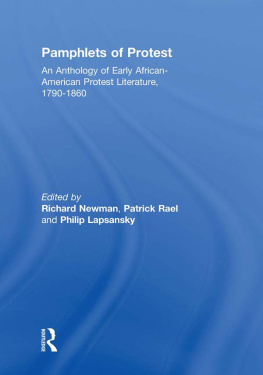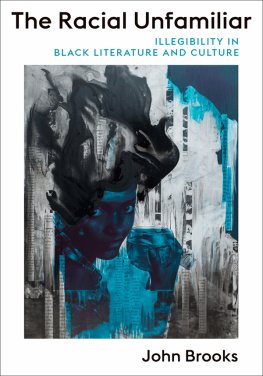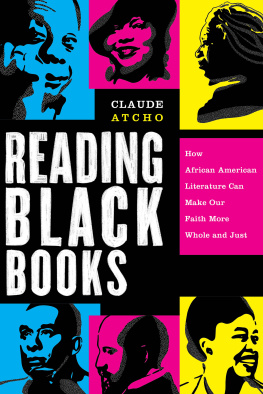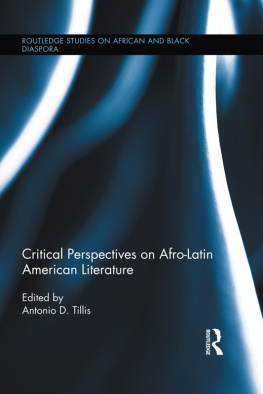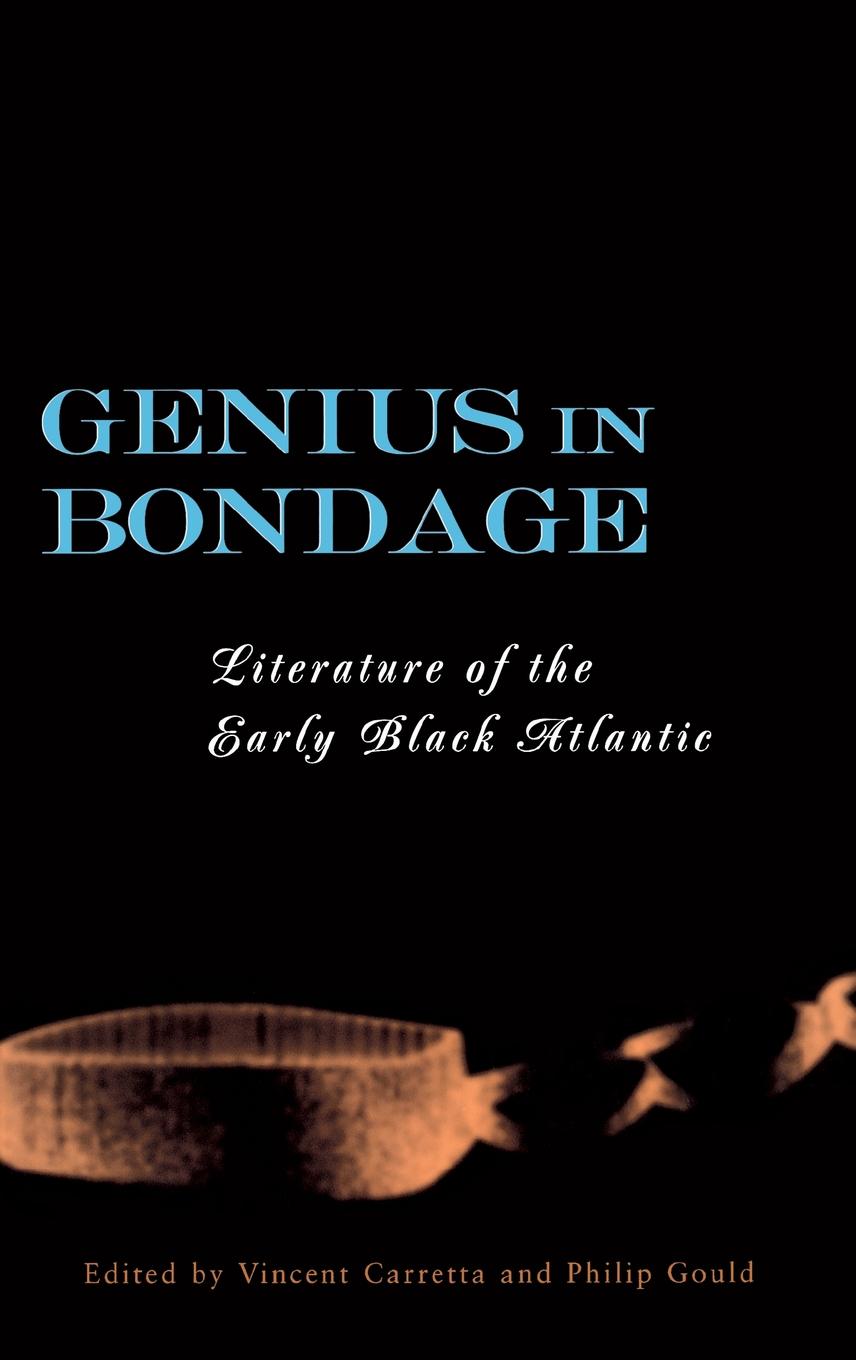Contents
Page List
GENIUS
IN
BONDAGE
GENIUS
IN
BONDAGE
Literature of the Early Black Atlantic
Edited by
VINCENT CARRETTA
and
PHILIP GOULD

Publication of this volume was made possible in part
by a grant from the National Endowment for the Humanities.
Copyright 2001 by The University Press of Kentucky
Scholarly publisher for the Commonwealth,
serving Bellarmine University, Berea College, Centre College of Kentucky,
Eastern Kentucky University, The Filson Historical Society, Georgetown College,
Kentucky Historical Society, Kentucky State University, Morehead State
University, Murray State University, Northern Kentucky University, Transylvania
University, University of Kentucky, University of Louisville, and Western Kentucky University.
All rights reserved.
Editorial and Sales Offices: The University Press of Kentucky
663 South Limestone Street, Lexington, Kentucky 405084008
05 04 03 02 01 5 4 3 2 1
Library of Congress Cataloging-in-Publication Data
Genius in bondage : literature of the early Black Atlantic / edited by Vincent
Carretta and Philip Gould.
p. cm.
Includes bibliographical references.
ISBN 0-9131-2203-1 (acid-free paper)
1. African literature (English)Foreign countriesHistory and criticism. 2. Equiano, Olaudah, b. 1745. Interesting narrative of the life of Olaudah Equiano. 3. Hammon, Briton. Narrative of the uncommon sufferings, and surprising deliverance of Briton Hammon, a Negro man. 4. Wheatley, Phillis, 1753-1784Criticism and interpretation. 5. Sancho, Ignatius, 1729-1780Criticism and interpretation. 6. English literatureBlack authorsHistory and criticism. 7. English literature18th centuryHistory and criticism. 8. Slaves writings, EnglishHistory and criticism. 9. AfricansForeign countriesHistoriography. 10. Slavery in literature. 11. Blacks in literature. I. Carretta, Vincent. II. Gould, Philip, 1960
PR9341.G46 2001
820.996dc212001002581
CONTENTS
/ Vincent Carretta and Philip Gould
PART ONE
RACE AND GENDER IN THE EARLY BLACK ATLANTIC
/ Roxann Wheeler
/ Karen A. Weyler
/ Felicity A. Nussbaum
/ Gillian Whitlock
PART TWO
MARKET CULTURE AND RACIAL AUTHORITY
/ Paul E. Lovejoy and David Richardson
/ Philip Gould
/ Vincent Carretta
PART THREE
LANGUAGE AND THE OTHER: THE QUESTION OF DIFFERENCE
/ Robert Desrochers Jr.
/ Frank Shuffelton
/ Rosemary Fithian Guruswamy
/ Markman Ellis
/ William L. Andrews
/ Robert S. Levine
FIGURES
INTRODUCTION
Vincent Carretta and Philip Gould
In June 1780, Ignatius Sancho wrote a letter to one of his many white correspondents describing the Gordon riots that had just erupted on the streets of London. More surprising than Sanchos disdain for the anti-Catholic mob is his description of the worse than Negro barbarity of the populace. Sanchos own reaction to the rioters, the vast majority of whom were white, refutes the belief in Negro barbarity he ironically invokes.
This moment in Letters of the Late Ignatius Sancho, an African (1782) is representative of the complex identities and languages of eighteenth-century black writing. Simultaneously British and African, Sanchos identity resists easy national and racial identifications; assuming deferential humility, he soon parlays the persona into cultural critique. The black writing that appeared during the eighteenth and early nineteenth centurieswhich included the genres of spiritual autobiography, captivity narrative, travel narrative, public epistle, sea adventure, and economic success storyis a literature of diasporic movement and cultural encounter. Born to enslaved African parents on a ship in the Middle Passage bearing its human cargo from Africa to the Americas and then brought to England, Sancho might serve as an emblem of most of the writers discussed in Genius in Bondage. Crossing the Atlantic meant that, while some were born with identities, and some had identities thrust upon them, by the very act of authoring their texts they all achieved identities they had played some significant role in fashioning.
As an emblematic figure, Sancho fittingly gives us the title for this collection of essays, the first devoted exclusively to transatlantic black writing between 1760, when religion first gave English-speaking black writers a voice, and 1833, when Britain ended slavery in its remaining colonies in the Americas. Not knowing that Phillis Wheatley had been manumitted shortly after her return to America in 1773 after a six-week visit to London, in 1778 Sancho wrote a letter of thanks to a Quaker correspondent in Philadelphia who had sent him a copy of Wheatleys Poems. With his comments on Wheatley, Sancho became the first Anglophone critic of a fellow black writer and one of the earliest black critics of the institution of slavery:
Phyllis poems do credit to natureand put artmerely as artto the blush.It reflects nothing either to the glory or generosity of her masterif she is still his slaveexcept he glories in the low vanity of having in his wanton power a mind animated by Heavena genius superior to himselfthe list of splendidtitledlearned names, in confirmation of her being the real authoress.alas! Shews how very poor the acquisition of wealth and knowledge arewithout generosityfeelingand humanity. These good great folksall knowand perhaps admirednay, praised Genius in bondageand then, like the Priests and the Levites in sacred writ, passed bynot one good Samaritan amongst them.
The appearance of Genius in Bondage continues recent critical interests in the field of eighteenth-century black writing. Until fairly recently, critical studies and anthologies of African American literature generally began with the 1830s and 1840s, as American abolitionism gained strength and the African American slave narrative proliferated largely in support of this movement. Prior to 1965, the idea that an early black-British tradition existed, or that any Anglophone black writer could (or perhaps should) be seen as having worked in any tradition other than American, was apparently unthinkable. During the past thirty years, however, several influential critical works of and on African-American, African-British, and transatlantic black literature have extended the historical and conceptual frames for the field into the eighteenth century.
During the 1960s, Paul Edwards led the way in the recovery of eighteenth-century transatlantic literature by people of African descent writing in English. With his magisterial introductions, Edwardss facsimile reprints of the works of Ignatius Sancho, Olaudah Equiano, and Quobna Ottabah Cugoano established the editorial, critical, and scholarly standards against which all subsequent workers in the field are measured.
This influential body of scholarship and criticism raises important questions about the nature of race and authorship in early black writing. As scholars such as Andrews and Gates emphasize, much of early black autobiography was spokenrather than writtenand transcribed by white editors who inevitably exerted a good deal of textual control. As Andrews has commented, [F]rom the outset of black autobiography in America the presupposition reigns that a black narrator needs a white reader to complete his text, to build a hierarchy of abstract significance on the mere matter of his facts, to supply a presence where was only Negro, only a dark absence.


